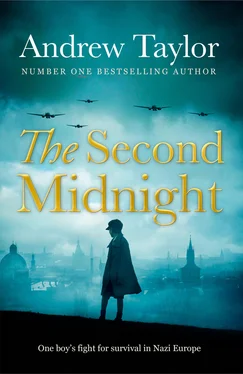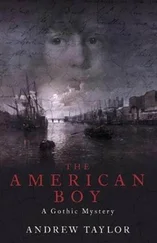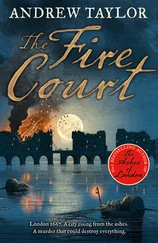1 ...6 7 8 10 11 12 ...21 Michael almost flinched at the quiet savagery which had suddenly invaded Dansey’s voice. At first he was inclined to attribute it to the bitterness which Dansey felt because Michael had been forced on him by Sinclair; then he noticed the lines of pain in Dansey’s forehead and the tiny beads of sweat on his temples. He felt an unexpected stab of pity for the man opposite him: combining a job like his with an ulcer must be an impossible task.
Dansey stubbed out his cigarette, precisely in the centre of the ashtray. Only when the last shred of tobacco was extinguished did he speak again. ‘This is important, you know. There’s very little time. The Czech Deuxième Bureau is really very good. They estimate that Hitler will move within a month – six weeks at the outside. Then there will be no Czechoslovakia – just another province of the Reich. We have to be in place by then.’
‘May I ask a question, sir? If Czech military intelligence is so good, they must be making their own contingency plans. Why aren’t we co-ordinating with them?’
Dansey shrugged wearily. ‘We are. Colonel Moravec and Gibson – he’s the SIS Head-of-Station in Prague, you know – are practically blood-brothers. But Moravec’s an intelligence-gatherer, not a guerrilla chieftain. His idea of a resistance movement is based on the boy scouts – and his political masters think the same. The other problem is geographical: a resistance movement needs a foreign base. Moravec naturally thinks of us and France, though God knows why after what we did to them at Munich. But it’s over two hundred miles between the French and Czechoslovak borders at their nearest points. And that’s as the crow flies across the Reich.’
Michael suddenly understood what Dansey was driving at. ‘But there’s another potential anti-Nazi ally whose border is far closer? And that’s why Hase is so important?’
‘Not just Hase. God help us, even Kendall could be important.’ Dansey’s thin lips twisted. ‘In the circumstances it’s probably just as well you used your initiative.’ He gave Michael no time to savour the unexpected compliment. ‘Where are you intending to have lunch with him?’
‘I thought perhaps the Berkeley Grill. Get him in a good humour.’
‘I think not, Stanhope-Smith. Catering to the sybaritic whims of its junior employees is not one of the purposes of this organization. I’m told that one can find a very decent lunch at a Lyons corner house.’
Dansey pushed back his chair and stood up. The movement triggered a flurry of activity among the waiters near the door. Michael stepped to one side to allow Uncle Claude to precede him.
He glanced at Michael as he passed. ‘I wish you wouldn’t carry a sketchbook in your jacket pocket,’ he observed waspishly. ‘It ruins the cut.’
After dinner on Sunday evening, Mr and Mrs Kendall listened to the news. When it had finished, Kendall prowled through the air waves of Europe.
‘It’s all damned rubbish,’ he said. He turned off the wireless and began to ream a pipe with unnecessary violence.
‘Yes, dear,’ said Mrs Kendall automatically. She decided that now was not the moment to mention the possibility of a rise in her housekeeping allowance.
Kendall rapped the pipe against the side of the ashtray; a small shower of carbon fluttered on to the arm of his chair.
‘I suppose I’ll have to come to some decision about Hugh soon. I’ve always said you spoiled him, Muriel: I hope you’re satisfied. What that boy needs—’
The front door slammed. Mrs Kendall looked up; there was a smile on her face.
‘It’ll be Stephen,’ she said. ‘He’s earlier than usual.’
‘It’s about time he got to bed at a respectable hour.’ Kendall chewed his pipestem. ‘And it’s a bit much, him going out on a Sunday, don’t you think?’
Stephen pushed open the door with a little more force than was necessary. He swayed slightly as he stood in the doorway; Mrs Kendall hoped his father wouldn’t realize he had been drinking.
‘Hello. Any tea left?’ Stephen pulled up a chair to the fire. Mrs Kendall refilled her husband’s cup and poured another for her son.
‘Have you had a nice evening, dear?’
‘I met Paul Bennet up in town.’ Stephen draped an arm along the back of his chair; there was a scowl on his thin, dark face. ‘He’s finally decided to go up to Cambridge this autumn. His father’s promised to give him a car – one of those little MGs.’
Muriel Kendall prayed silently that Stephen would say no more; it would only infuriate his father. Downing College had offered Stephen an exhibition to read modern languages, but he had been unable to take it up because his father refused to find the rest of the fees. The decision had provoked one of the rare open quarrels between Stephen and his father. Her elder son had always been adept at concealing his feelings. Only ambition and, more recently, alcohol allowed one a glimpse of what was going on in his mind.
‘Ridiculous to give a car to a boy that age. When I was nineteen, we thought ourselves lucky to have a bicycle.’
To his mother’s surprise, Stephen said nothing to this. He finished his tea and stared into the fire. His next words were spoken in such a casual tone that Mrs Kendall was immediately suspicious.
‘A lot of chaps at the bank are saying there’s sure to be a war by the end of the year.’
Kendall grunted. ‘They’re probably right.’
‘One or two of them have already joined the Territorials. I was wondering if I should, too. With my background they’d probably give me a commission, wouldn’t they? And if there’s a war, we’ll all be called up in any case.’
Alfred Kendall nodded slowly. There was a flicker of interest in his eyes at the thought of his son becoming an officer and a gentleman.
‘I asked Mr Horner and he thought it was quite a good idea. He said it’s always best to get to the head of the queue.’
Muriel Kendall suppressed a smile. Stephen knew exactly what he was doing. First he had played on Alfred’s gentlemanly aspirations; then he invoked the powerful name of Horner, the sub-manager at his branch – and also, incidentally, the man who had approved the overdraft for Kendall and Son. She would be surprised if Stephen’s briefcase didn’t contain an application form, all filled in except for the space where his father’s signature was needed.
‘I’ll think about it.’ Kendall often deferred family judgments, chiefly on the principle that his decisions seemed weightier when they were finally delivered.
Stephen nodded gravely; his expression implied that he would be happy to accept whatever his father decided; he knew as well as his mother that he had already won his point.
Shortly afterwards, Kendall announced that it was time for bed. Stephen went up first, while his father made up the fire and his mother washed up and laid the table for breakfast. Kendall unlocked the sideboard and poured himself a nightcap. He sat beside the dying fire, sipping his whisky and smoking a last cigarette.
There was a pile of ironing on the kitchen table. Mrs Kendall took it upstairs with her, balancing her hot-water bottle on top. She wrapped her husband’s pyjamas around the bottle and began to put away the ironing. Her movements were slow, as they generally were when she was alone; in the last twelve months, it was as if her limbs were turning gradually from flesh to lead. She put the children’s clothes to one side. There was no point in disturbing them.
Halfway down the pile she came to one of Hugh’s shirts. It prodded her memory: she had forgotten to lay out Hugh’s weekday suit and give him clean clothes for the morning. It would be just like him to come down to breakfast in a dirty collar and his Sunday suit; and it would be just like his father to seize the opportunity to go berserk.
Читать дальше












